English | Français

Overview
About the Project
The Community Action for Workforce Development program was an initiative funded by the Government of Canada through the Community Workforce Development Program that piloted intersectional, community-led workforce planning models in three rural communities across Canada, supporting economic diversification strategies that took action on climate change and contributed to clean growth. In each community, the process engaged small and medium enterprises from a range of industries and sectors, as well as relevant community-based organizations and public agencies, in community workforce planning, training, and work placements to provide upskilling and reskilling training, wrap-around supports, and work placements.
About CCEDNet
The Canadian Community Economic Development Network (CCEDNet) is a values-based, non-profit association committed to connecting people and ideas for action that builds local economies, strengthens communities, and benefits everyone. We have members throughout Canada, including organisations, networks, and individuals who are strengthening sustainable and equitable local economies. Members are active across many sectors such as community development, social enterprise, rural development, co-operative development, employment development, and housing.
We are committed to the values of Inclusion, Diversity, Equity, Dignity, Self-Determination, Solidarity, and Local Control. Together, we are working towards sustainable and inclusive communities directing their own social, environmental, and economic futures through our Theory of Change.
Project Partners
CCEDNet is working with the following community partners to complete this project:
Wild Roga, Town of Arnprior, Ontario
WildRoga is a Black led company with a profound focus on wellness and community empowerment. They are dedicated to collaborating with like-minded organizations and enterprises that prioritize community-driven initiatives through creative solutions. Through a variety of events, comprehensive training programs, expert consulting, and coaching services, WildRoga provides invaluable resources to bolster local businesses and community-led projects. Their commitment extends to supporting marginalized communities in rural areas, striving to break down barriers. WildRoga also champions creative endeavors that help individuals connect with their passions, fostering personal growth beyond the constraints of traditional structures. Their mission revolves around empowering, unifying, and unlocking the full potential of communities.
Community Futures Lesser Slave Lake, Town of Slave Lake, Alberta
Community Futures Lesser Slave Lake is a community driven, non-profit organization focused on supporting small to medium enterprises with business development and loans. Community Futures is a pillar of support to the surrounding rural region and is committed to supporting local businesses to build sustainable, inclusive, and thriving communities. Community Futures develops and manages a number of initiatives including studies, census surveys, labour attraction and retention events, business training events, conferences, and economic development projects. There are business loan options, training courses, personal business coaching and networking events available for small businesses. Community Futures has been supporting small business and rural economic diversification since 1986 in 27 officers throughout rural communities in Alberta, and 269 in the country.
Golden Community Economic Development, Town of Golden, British Columbia
Golden Community Economic Development (Golden CED) is an inclusive nonprofit which engages and supports residents with community-led development. Our initiatives aim to contribute to a vibrant and healthy economic, social and environmental landscape where all residents have access to a good quality of life and a sustainable future. Golden CED Guiding Principles: - Quality of life - making Golden a great place to live, work and play. - Sustainable growth - preserving the community, small-town feel, local experience and affordability. - Economic diversification - support current industries and attract new ones (cleantech) and also support small business growth. - Climate action - protect the environment, and natural amenities, and ensure climate security.
Community Data Program (CDP)
CDP is preparing a rural community workforce development data portal for all municipalities across Canada to provide secondary data that can support these communities in developing their own workforce development plans and enacting a similar project.
Project Documents
Community Profiles
Arnprior, Ontario
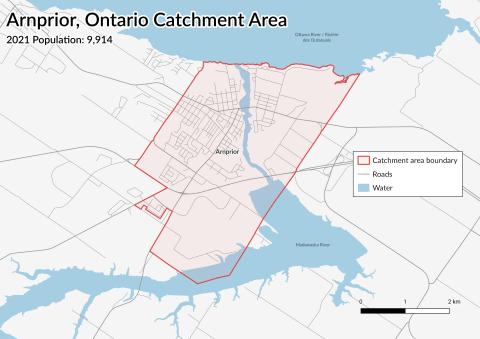
Click here to download the Community Profile slides.
Golden, British Columbia
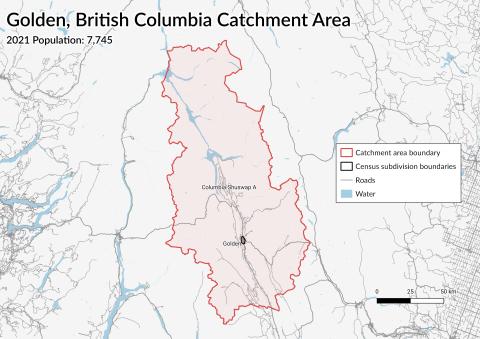
Click here to download the Community Profile slides.
Slave Lake, Alberta
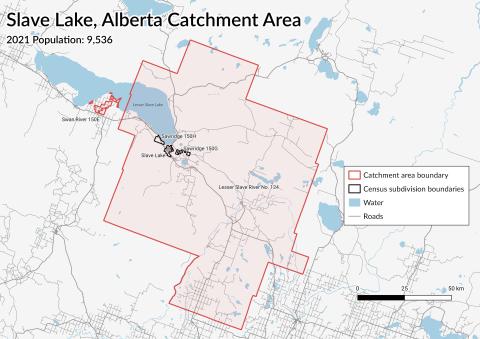
Click here to download the Community Profile slides.
Click here to download the data used to produce the Community Profiles.
Clean Economy Profiles
An overview of the clean economy
Clean Economy Opportunities
Clean economy opportunities in each of the three partner communities.
Arnprior
Golden
Slave Lake
GHG Emissions and Labour Force Population by Economic Sector
A summary of GHG emissions by industrial sector and the size of each sector for each of three partner communities:
Arnprior
Golden
Slave Lake
A spreadsheet linking GHG emissions by economic sector at a provincial scale to community-specific industrial sectors for all of Canada:
- English: Download (.xlsx)
- French: Download (.xlsx)
MEED: Municipal Energy and Emissions Database
A free online GHG emissions inventory for 4000+ communities across Canada. MEED is an open data platform that builds GHG inventories using downscaled national and regional data sources:
Eleven Ways To Measure Clean Growth
A 2020 report prepared by the Canadian Climate Institute offering an 11 indicator framework for measuring clean growth.
View the report here:
View the main website here:
Infographics and Dashboards
Community Profile Infographics - Demographic ProfileImage
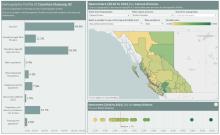
Click here to download this infographic from the catalogue.
|
Community Profile Infographics - Labour Force and IncomeImage
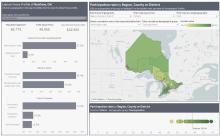
|
Community Profile Infographics - OccupationImage
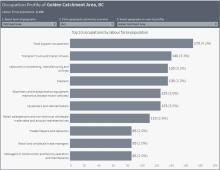
|
Community Profile Infographics - IndustryImage
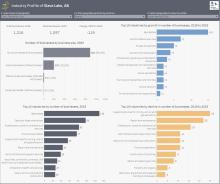
|
Community Profile Infographics - CommutingImage
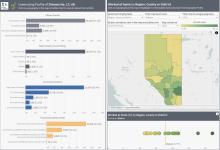
|
Community Profile Infographics - Population ChangeImage
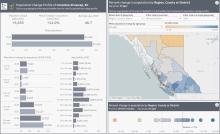
|
Community Profile Infographics - Clean EconomyImage
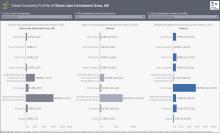
|
Community Profile Infographic - Business Count Profile, December 2023Image
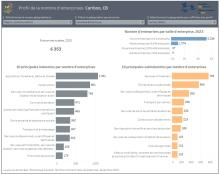
|
How-to Guides
For more information, please refer to these step-by-step guides:
- Registering and Creating a User Account
- Accessing data using the Beyond 20/20 data tool
- Accessing Dashboard and infographics using Tableau Data Tool
Click here to view definitions for terminology used in the Community Profiles.
For an orientation of the Beyond 20/20 software, skip ahead to the 30-minute mark of this orientation: https://communitydata.ca/resources/webinars/orientation-aug-16
You can also contact information@communitydata.ca if you have any questions about the data or this data portal.
Webinars
Upcoming Webinars
- TBD: Community Partner feedback on the Community Workforce Development Infographics
Past Webinars
- October 25, 2023: Orientation to the Community Data Program, the Catalogue and More
See the full list of upcoming and past webinars here. Recordings are available for most past webinars.
CDP Membership
Is your organization already part of a Data Consortium? Register as an individual user and find out more about the CDP.
Do you represent a member organization that needs to renew their membership? Do it online.
If a Consortium already exists in your community, you can join an existing Consortium as a Member Organization.
If there's no Consortium in your community, we encourage you to start one! It's a great way to access small-area data, bring together local groups, and join the Canada-wide CDP network.
- Learn more about membership in the Community Data Program
- Learn more about the Community Data Program
- See the CDP orientation presentation
- Check out a Memorandum of Agreement template
- Contact the CDP to establish a new Consortium in your community